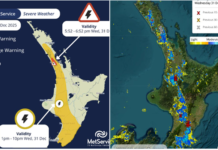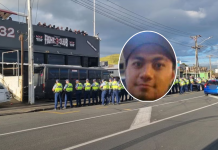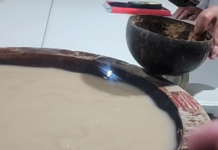Tonga’s Supreme Court has convicted ‘Etuate Sungalu Lavulavu of bribery and spending over the legal limit on his 2014 election campaign.
According to Lord Chief Justice Owen Paulsen, the conviction is enough for the disgraced politician to lose his Parliamentary seat for Vava’u No. 16.
The judge said Lavulavu was not a credible witness and that his evidence was implausible, evasive and untruthful.
The conviction is the latest in a series of blows suffered by the former Minister of Infrastructure, including an impeachment attempt, the loss of his ministerial position and an investigation involving the Ministry of Infrastructure’s mechanical supervisor in which he was accused of abusing his power.
However, Lavulavu’s counsel, Siosifa Tu’utafaiva, has indicated they will lodge an appeal.
In yesterday’s ruling Mr Paulsen declared Lavulavu had “knowingly” and “intentionally” spent more than TP$10,000 (NZ$6574) on his election campaign in breach of section 24(1).
According to Section 24 (5) of Tonga’s electoral law, it is an offence for any candidate to spend more than TP$10,000 on an election campaign or to fail to deliver the statement referred to in subsection (4) or to deliver a false statement, and any person found guilty shall be liable to a fine not exceeding TP$10,000.
If somebody is convicted under Section 24 (5) and the circumstances of the offence are sufficiently serious, the Court may declare the candidate’s election to be void.
Lavulavu represented Vava’u 16 and after he was elected to Parliament he became a member of the Democratic Party and a government minister.
The ruling against Lavulavu came after failed parliamentary candidate Dr. Viliami Uasike Latu and his co-petitioner, ‘Aisea Silivenusi, lodged complaints of corruption and illegal campaigning in Tonga’s 2014 General Election against him.
Mr Paulsen found that Lavulavu failed to disclose spending on his election campaign amounting to TP$67,550.07 (NZ$44,408).
The amount was made up of TP$3454.87 (NZ$2271)paid to Sitiveni Pongi for fuel, TP$2255.20 (NZ$1479) paid to Gateway Petroleum Services for fuel, TP$6250 (NZ$4108) paid to the operators of heavy machinery as wages/overtime, TP$7590 (NZ$4989) paid to the Ministry of Infrastructure for the hire of a bulldozer and there a valuation of TP$48,000 (NZ$31,556) for coral rocks.
“There is no doubt that Mr Lavulavu made these payments knowingly and intentionally and I am satisfied that it has been established that he committed an offence against section 24(1)”, Mr Paulsen said.
Mr Paulsen said: “The circumstances of his offence are sufficiently serious as to require the making of a declaration that his election is void”.
Mr Paulsen also ruled that Lavulavu committed bribery on three different occasions in breach of section 21(1)(a) of the Electoral Act 1989.
Mr Paulsen found that a cash payment of TP$50 Lavulavu gave to Kika Melekiola and Vai Lau’i of Leimatu’a, a gift of TP$100 Lavulavu gave the Sei ‘o Lepuha Weavers one day before the election, and TP $4,000 Lavulavu’s wife Akosita Lavulavu donated to Leimatu’a Growers and Women Development Association were all bribes.
The Association
The court was told the Leimatu’a Growers and Women Development Association was formed in September 2014 by Lolotonga Sekeni, ‘Etuate Sungalu Lavulavu and others to find overseas markets for local crops. It was later extended to include works to improve the roads in the district.
Lavulavu denied Dr Latu’s argument that the TP$4000 (NZ$2629 )his wife gave to the Association was a bribe intended “to influence votes or that the payment had anything whatsoever to do with his election campaign.”
Mr Paulsen said that in order to determine whether Dr Latu’s argument was valid, he attempted to answer four questions: Did Akosita give the money? If so, did she give the money ‘to or for any elector’? Was the TP$4000 given on behalf of Mr Lavulavu? If so, was it given in order to induce any elector to vote or refrain from voting?
On the question of whether Akosita Lavulavu give the money?
Section 21(1)(a) requires that a candidate or any other person on their behalf “gives any money or valuable gift”. Under section 21(2) the giving of money or other valuable gift includes “giving…agreeing to give…offering, promising or promising to procure or try to procure, any money or valuable gift”.
According to the judgement Lavulavu’s wife gave the money in the sense that she offered it, promised to procure and tried to procure it.
The judge defined the word “give” according to Collins Concise English Dictionary in which it “simply means to voluntarily hand over or part with possession of something to another.
Mr Paulsen concluded that Akosita Lavulavu had voluntarily handed over the TP$4 000..
He said he was satisfied the gift to the Association was a bribe.
On the question of whether the money was given to or for an elector, he found that the money was given to the association for cash prizes and the prize winners were “all, or at least a good number, of them were registered electors.”
Mr Paulsen also accepted evidence from two witnesses, Livingi Katoa and Lolotonga Sekeni, who were awarded prizes, that they were registered electors in the Vava’u No. 16 Electoral District.
“It was therefore proved that the money was given ‘indirectly’ (that is by way of the Association) ‘for an elector’ for the purposes of section 21(1)(a),” Mr Paulsen said.
As to whether the donation was made on behalf of Mr Lavulavu?
The judge said that “a person may become a candidate’s agent” in the context of any case laws.
An agent could be an “actual appointment or employment or by recognition and acceptance of their actions by the candidate.”
To find out whether Mrs Lavulavu was an agent of her husband, Chief Justice Paulsen referred to the case law known as Bay of Islands Election Petition [1915] 34 NZLR 578 and others.
The judge concluded that “Personal intimacy is evidence of agency. In the case of a candidate’s wife, where she concerns herself in her husband’s election she is ipso facto regarded as his agent and is taken to have acted on his behalf.”
Coral rocks and spending on road works
The complainant, Dr Latu, also argued that Lavulavu donated coral rocks to help pave 47 roads in his electorate and that this was intended to induce voters to support him.
Dr Latu also argued the money Lavulavu spent on the road works for the hire of a bulldozer, the purchase of fuel and for the wages of heavy machine operators as well as the value of the coral rocks counted as bribes.
Dr Latu told the judge if that money was not a bribe Lavulavu should have listed it on his election expenses the law required he submit to the electoral office 14 days after the election.
Lavulavu claimed the road works were undertaken by the Vava ‘u Road Works Council,Inc and were not part of his election campaign, but this argument was rejected by the judge.
Lavulavu also denied paying any costs associated with the road works and said that they were paid from money given by Saia Moehau, but this again was rejected by the judge.
Mr Paulsen said he did not believe Saia Moehau donated any money and there was no evidence submitted to court to prove that.
The judge found that Lavulavu “used the Association as a vehicle for his election campaign” and that his “wife Akosita actively participated in her husband’s election campaign.”
Mr Paulsen said Lavulavu’s wife donated the money “for the purposes of Lavulavu’s election campaign” and that Lavulavu was well aware of it.
Dr Viliami Uasike Latu was represented by Counsel William Clive Edwards Snr.
Lavulavu’s credibility questioned
In his ruling, Lord Chief Justice Paulsen described Lavulavu’s evidence as implausible, evasive and untruthful.
“I am of the view that Mr Lavulavu was not a credible witness,” the judge said.
“I consider that his intention throughout the trial was to dissociate himself from his own conduct and to obfuscate rather than inform. Often Mr Lavulavu’s evidence was simply implausible. His answers to questions in cross examination were evasive. He denied knowledge of matters when his knowledge could not seriously be in doubt. For example, Mr Lavulavu denied knowing whether he was a Minister.
“On a surprising number of occasions Mr Lavulavu accused other witnesses of lying. Given the frequency of the accusation this left a very poor impression with me.”
In contrast, Chief Justice Paulsen said Dr Latu’s credibility was never undermined.
“He impressed me as an intelligent, considered and honest witness,” the judge wrote.
The main points
- Tonga’s Supreme Court has convicted ‘Etuate Sungalu Lavulavu of bribery and spending over the legal limit on his 2014 election campaign.
- According to Lord Chief Justice Paulsen, the conviction is enough for the disgraced politician to lose his Parliamentary seat for Vava’u No. 16.
- The judge said Lavulavu was not a credible witness and that his evidence was implausible, evasive and untruthful.
- The conviction is the latest in a series of blows suffered by the former Minister of Infrastructure, including an impeachment attempt, the loss of his ministerial position and an investigation involving the Ministry of Infrastructure’s mechanical supervisor in which he was accused of abusing his power.







